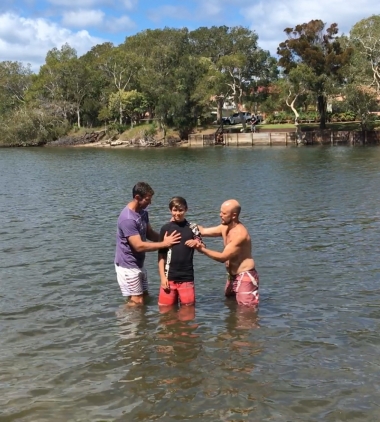Baptism has the power to be a life-affecting rite of passage for our adolescent children

Modern western society seems to have lost the art of ritual and to a certain extent, rites of passage, particularly for our young people.
Even in our post-Christian world, the church at times has failed to embrace some of the rituals of the ancient and traditional churches for fear of turning these into boring, meaningless rituals with no relevance today.
What sorts of rites of passage would be suitable for my sons?
I remember all too clearly sitting at a conference and hearing a father speak of the dilemma of whether to allow his 17 year old daughter to go to "Schoolies Week" on the Gold Coast. His fear came more from the statement of another father who expressed his desire to equip his son for the week away and saw this as an opportunity for his son to become a man.
All his son needed to "become a man" was to be given a carton of beer and a box of condoms for the week, and he would come back from the experience, a man.
My eldest son is in Grade 11 and we have been busy saving for a trip overseas as a reward for his years of schooling. This process started in Grade 7 for him and it has taken away the focus from "leave school – get drunk – get laid – get in a fight" that preoccupies many students' minds during their final year of school. I have many students I have taught who have not got caught up in this mindset, but plenty have, even if it was not their focus to begin with.
On the weekend after Easter, my 12 year old son went through the ritual of baptism. He had been expressing this desire since he was 10 to be baptised and as parents, we have gradually, carefully, methodically watched from afar his journey up to the point we felt comfortable with him to make this decision. There are plenty more adult decisions he will have to make in his life, but we felt this was one decision he had to make, he had to own, and he had to control.
My wife and I have been active together in churches for 20 years and have brought our sons up "in the church", so to speak. Being involved in a church puts your family inside a bubble and the constant challenge is make your faith relevant to yourself, then to your family, and then try to "live it", "walk the walk, not just talk the talk" outside in the community.
My decision to become a Christian happened when I was 17. My second son has, from my perspective, never decided to become a Christian, he has always just seen himself as one.
He decided to step out of his "Christian bubble" and publicly declare himself a Christian by going through the ritual of baptism.
Why do this? Simply because, this is what Jesus did. Jesus' baptism is recorded in the Bible, so we should do the same.
Special occasion
He invited friends from school, we invited family. He decided he wanted one of the school chaplains who attends our church to baptise him, with his Dad standing beside him as well. We have only known this guy from church for 5 months, but the impact on my son has been enormous.
His journey has been quite remarkable in itself and he quite humbly admires my 12 year old's decision to follow Jesus, because as a 12 year old, he made the decision to say there is no God and to live a destructive life through his teenage years.
We chose a park that backs onto the sea entrance, walked down together to the water's edge, Chappy Dave gave a short message about baptism and prayed for my son. All three of us walked into the water to waist deep level and "in the name of the Father, Son and Holy Spirit", my son was laid down in the water and brought back up. I then prayed for my son. The 40 or so family and friends on the beach clapped and cheered.
My son said, "Thanks."
Afterwards, he said he felt, "the same, but different." He hasn't magically changed or grown a few extra inches, but he has started a journey that is his own and no longer is just my responsibility.
This step or rite of passage is important and not some out-dated church ritual. It is a marker in his life he can use to reflect on, ask questions about, and turn back to when troubles come. It is putting trust in a God who can often seem "out there" and never close, yet has always been.
It is following the teachings of Jesus, reading about them and putting them into practice by living the way Jesus would want him to live. It is having the Holy Spirit be his teacher, counsellor and guide; allowing the presence of God to live in him and change him into the man God wants him to be, rather than the man the world expects him to be.
Russell Modlin teaches English and Physical Education at a Christian School on the Sunshine Coast. He is married to Belinda and they have three children. Russell Modlin's archive of previous article can be found at www.pressserviceinternational.org/russell-modlin.html This article appears courtesy of Christian Today Australia











